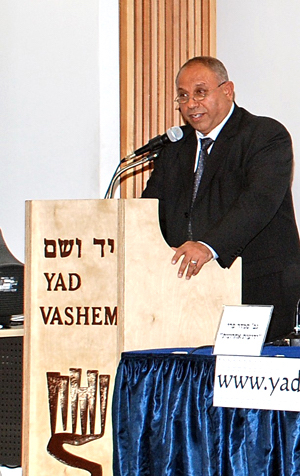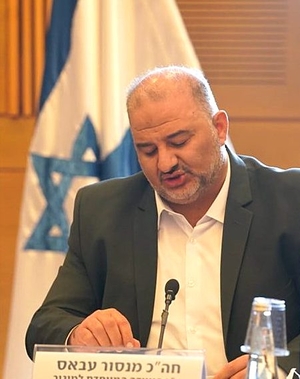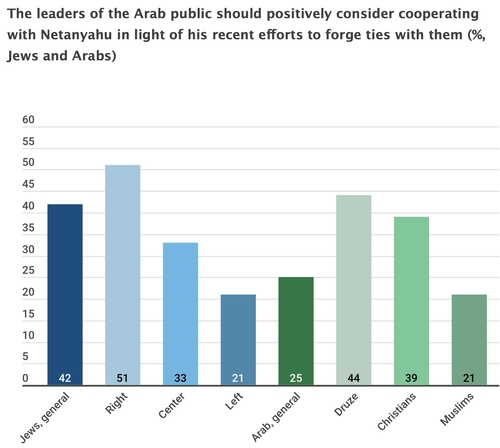That four Arab states in four months normalized relations with Israel is a remarkable development that opens the possibility that the Arab states' war with Israel, which began in 1948, is winding down.
But there is more good news, less visible and also potentially momentous: a change taking place among the people who constitute Israel's ultimate enemy, its Arab citizens. This sector may finally begin to end its self-imposed political isolation and recognize the Jewish state.
 Israel's first Arab minister, Raleb Majadele, speaking at Yad Vashem in 2008. |
That population long ago escaped its rural confines, having become educated, mobile, and connected. By now, it has included a supreme court judge and a government minister, ambassadors, businessmen, professors, and many others of distinction.
Despite this impressive progress, the community has consistently voted for radical and anti-Zionist representation in Israel's parliament, the Knesset. While its members (MKs) have differed sharply among themselves in ideology, dividing into Palestinian nationalist, pan-Arab nationalist, Islamist, and leftist, all reject Israel's Jewish nature.
Doing so excludes them from influence in governing the country. Not only are they barred from deciding sensitive foreign and defense issues, but they have virtually no say over the formation of governments and only on the rarest of occasions (such as the Oslo accords in 1993) do they have a voice in major government decisions. All attempts by Arab politicians until now to break this logjam have failed.
 Mansour Abbas in the Knesset. |
Abbas (not to be confused with Mahmoud Abbas, 85, head of the Palestinian Authority) has recently emerged as a deal-making politician ready to act pragmatically on behalf of Israel's Arabs. At a time of electoral turbulence, with new elections scheduled for March 2021, he has become an instant powerbroker due to his readiness to cooperate with Benjamin Netanyahu and perhaps even to save Netanyahu's prime ministry.
He speaks openly of his intentions, saying "Netanyahu tries to take advantage of me, but I do the same to him." Specifically, he wants Netanyahu to ease legal construction in Arab towns and approve funds to address Arab crime problems. Success in these areas could provide him with sufficient appeal to win more seats in the next parliament.
A recent poll shows Abbas' approach has struck a nerve. Also, Yousef Makladeh of StatNet, a consulting company, reports: "Over 60 percent of the [Israeli] Arab population supports MK Mansour Abbas' approach, that they can work with the [Jewish] right." He adds that "A majority of the Arab public favors the peace agreements with the Gulf States."
While Ariel ben Solomon of JNS dismisses Abbas' changes merely as "a tactical move," Mazal Mualem of Al-Monitor calls him "one of the most influential people in Israeli politics" and Gil Hoffman of the Jerusalem Post suggests his alliance with Netanyahu "could change Israeli politics forever."
Indeed it could. Abbas offers a path for Israeli Arabs finally to abandon the old, sterile negativity vis-à-vis the Jewish state. His flexibility might repudiate the influential 2006 study, The Future Vision of the Palestinian Arabs in Israel, which offers loyalty to Israel only after it sheds its Jewish nature and becomes a bi-national state in which Palestinian culture and power enjoy complete equality.
This development advances the Israeli Arabs' increasing awareness of the dismal reality of Palestinian life in Iraq, Syria, Lebanon, Jordan, the West Bank and Gaza, and recognizing, in the words of one Jerusalem resident, that "The hell of Israel is better than the paradise of Arafat." Also, it confirms the tectonic shift in attitudes toward Israel, where Arabs and Muslims increasingly accept Israel even as the global Left progressively rejects it.
 Palestinian life in Syria: the Yarmouk Camp of Damascus in 2015. |
Though few and weak, its Arab citizens have exceptional importance for the future of Israel. May it be positive.
Mr. Pipes (DanielPipes.org, @DanielPipes) is president of the Middle East Forum. © 2020 by Daniel Pipes. All rights reserved.
 The "Washington Times" illustration. |
Dec. 23, 2020 addendum: Ronen Tzur, a senior adviser to Defense Minister Benny Gantz, agrees on the importance of the Abbas-Netanyahu nexus:
בכל הכאוס הכללי קרה דבר היסטורי: הברית שכרת הלילה נתניהו עם החכ"ים הערבים של רע"מ היא זו שתפיל אותו בהרכבת הקואליציה הבאה. תם עידן החרם על הח"כים הערבים, והממשלה הבאה תוקם יחד איתם מימין או משמאל. ההישג ההיסטורי רשום על שמו של אחד: בנימין נתניהו.
— ronen tzur (@RonenRt) December 22, 2020
Dec. 26, 2020 update: The Israeli comedy show Eretz Nehederet ("It's a Wonderful Land") included a skit today poking fun at the beautiful Abbas-Netanyahu friendship.

Dec. 30, 2020 update: Due to Abbas' maneuver, writes Jalal Bana, "it's possible that together, Likud, Shas and even Yamina could siphon a mandate or two from the Joint List, and in the long term maybe even much more."
Jan. 20, 2021 update: Jalal Bana adds: The disconnect between the Ra'am and the other members of the Joint Arab List is "getting worse by the day. This was made apparent at several recent events where Abbas and his fellow party members stood far away from the other members of the Joint Arab List, preferring not to speak even at a time when they were meant to at least give an appearance of solidarity."
Feb. 7, 2021 update: "Should leaders of the Arab public positively consider cooperating with Netanyahu in light of his recent efforts to forge ties with them?" An Israel Democracy Institute poll finds 25 percent of Arabic-speakers reply in the affirmative. That number breaks down to 44 percent of Druze, 39 percent of Christians, and 21 percent of Muslims, with the last number by far the most important. While not a large number, 21 percent provides a good basis for further growth, perhaps with a prime minister other than Netanyahu.

Mar. 25, 2021 update: Israeli elections took place two days ago and Yehuda Shlezinger, Israel Hayom's religious affairs correspondent, sees "a turning point in Israel's ties with its Arab citizens":
The fact that Mansour Abbas and his Ra'am party passed the electoral threshold is big news. For years, the Arab political parties focused on the Palestinian issue. They were more worried about the "occupation" than they were about members of their own community here in Israel.
Abbas sought to put these issues aside and focus on the ability of young Arabs to integrate into the State of Israel, and honestly, why wouldn't he? It looked bad at first. Abbas was slandered and attacked, but the elections proved that hundreds of thousands of Arabs want to change course and see how they can become a part of the Israeli story.
Apr. 1, 2021 update: Abbas' 7-minute speech in Hebrew on prime-time Israeli television, carried by every station, is a potential political turning point for Israeli Arabs. He spoke very moderately, quite at odds with his and his party's historic views. Let's hope he's sincere and not pulling a second Arafat, saying one thing in Arabic and another to the rest of the world.
Dec. 21, 2021 update: Abbas made a remarkable statement today that has the potential to change the nature of the Palestinian-Israeli conflict for the better: "Israel was born a Jewish state, that was the decision of the people, and the question is not what is the identity of the state — it was born this way and it will remain this way." Let's see how it plays out.
